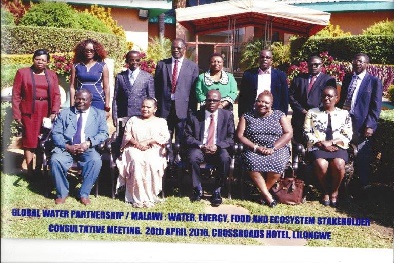The consultations are on response to a call made after the 42nd Committee on World Food Security for action to all concerned players to work together towards achieving sustainable Food Security and Nutrition. The discussions were intended to pursue the development of a GWP water-food-energy-ecosystems programme commencing with the water, food & nutrition nexus, in view of the increasing risks due to climate change.
As part of the process leading to the development of a GWPSA programme proposal for sub-Saharan Africa on Water and Food security in the context of climate change and the broader nexus thinking, Malawi and Lesotho have been selected considering its drought and flood vulnerability, recent disasters and difficulties, dependence on rain-fed farming and contribution of agriculture to addressing poverty and contribution to local and national economies. As the affected countries, they are in the best position to advice and input on the development of this GWP programme for sub Saharan Africa.
The value addition of this initiative is in the establishment of a bridge between two issues very often separately tackled in public policies, food security and water security.
The results were;
- Enhanced understanding of the complexities of water and food security at country level among national stakeholders as a result of the exchange/dialogue between participants of diverse backgrounds.
- In doing so, each participant got the benefit of becoming a resource person for a cultural synergy which will ultimately develop and validate intersectoral common positions, share common views and commit to solutions and actions to be taken.
- Enhanced quality of their involvement in this area and contribution to a positive and common culture that promotes development of new collaborations.
Country reports setting out succinctly the views of the participants on the key issues for the future food and water security agenda is expected from the workshops. The report will be centered on water resources management and its relationship with food security and it’s various recommendations are expected to be presented at a workshop to be held in Addis Ababa later in May 2016 in Addis Ababa involving others in Africa and GWPO to develop the sub-Saharan African.
To date, there have been a number of events and discussions on water and food security. In 2015, GWP facilitated consultations on water and food security at country level in 9 countries based on the CFS High Level Panel of Experts’ report on water and food security and nutrition. In the SADC region, Zimbabwe had this opportunity to make recommendations on the challenges for water and food security, based on the CFS High Level Panel of Experts’ report on water and food security and nutrition. These consultations initiated a strong multi-stakeholder approach between different key sectors in government, commercial, and other players. At a practical level, they identified specific country priorities in line with the CFS report recommendations. These consultations provided concerned governments with a widely shared position on water and food security issues and challenges in their country. These elements were presented at the end of June 2015 to officials and made available to country representatives at FAO as an additional support for negotiating and promoting country positions in the CFS discussions at their 42nd session.
